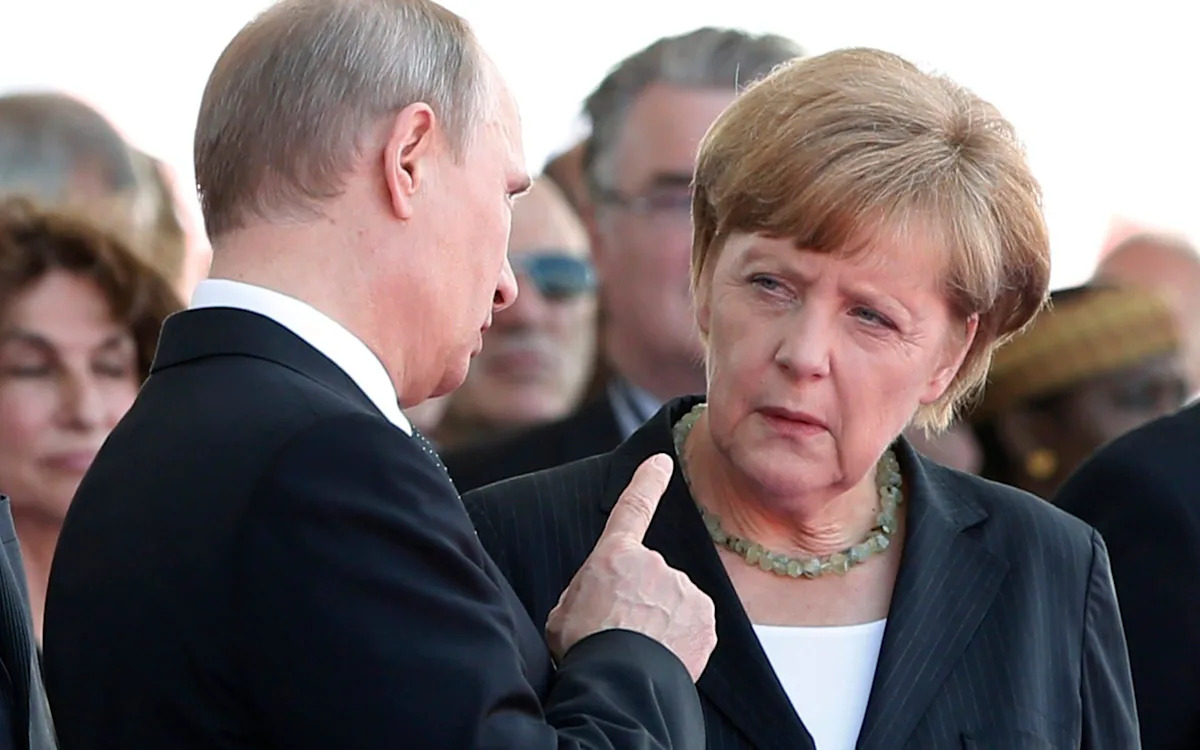
Angela Merkel’s government was preparing to train Russian troops at a series of state-of-the-art military facilities right up until the moment Moscow invaded Crimea.
The plans were part of a £870m deal that would have seen German troops train their Russian counterparts at eight complexes across Russia, kitted out with some of the most sophisticated military hardware in Europe, including replica guns that fire lasers.
The revelations were made in a book titled “The Failure – an investigative history of Germany’s Russia policies”, and reported by Der Spiegel.
In the book, journalists Katja Gloger and George Mascolo write that Russia was on the back foot after its dismal performance during the invasion of neighbouring Georgia in 2008.
Despite seizing 20 per cent of the country in less than a week, Russia’s military was badly organised and out of shape. Soldiers were poorly equipped and made basic mistakes.
Putin’s training request was prompted by Russian forces’ dismal performance during the invasion of Georgia in 2008 – Bela Szandelszky/AP
The ham-fisted invasion was a wake-up call for Vladimir Putin to modernise his army and bring it to Western European standards.
His inspiration was Germany’s military training centre north of Magdeburg in Saxony-Anhalt, considered one of the finest in Europe.
The centre simulates war to a high level of realism, featuring laser-mounted cannons and rifles, sensors and pyrotechnic equipment provided by Rheinmetall, German’s leading arms manufacturer.
The Bundeswehr calls the training centre the “most modern training facility in Europe.”
Putin made an unprecedented request to work with the Germans to train Moscow’s forces in a similar way in Russia.
According to the book, the German government responded positively.
“It was the German political directive to welcome the Russian desire for cooperation and – as far as possible – implement it,” said retired Gen Josef Niebecker, who served as Gerhard Schröder’s military advisor in his chancellery and was sent to Moscow as defence attache in 2007.
During a visit to Moscow in 2011, Thomas de Maiziere, then defence minister, said: “We have a security policy interest in a modern, well-led Russian army.”
Russia wanted eight combat training centres for all military districts, with everything to be completed by 2020, including lecture halls for discussing the manoeuvre results. The total cost was €1bn.
Rheinmetall has said that it played virtually no role in the business at the time and that the government was the project’s driving force.
Mr de Maiziere said: “I had reservations. That was a matter of innermost thought.” But there was “a great deal of pressure”, including from members of his own party, from the army “and also from industry”. The project was effectively abandoned after Russia invaded Crimea in February 2014.
Russia wanted eight combat training centres completed by 2020 at a cost of €1bn (£870m) – Alexander Polikarkin/AP
Despite not coming to pass, revelations of the military deal undermine Ms Merkel’s comments that Poland and the Baltic states should have better engaged with Putin after the Minsk agreements in 2014.
“After I left office, Putin’s aggression began,” she told Partizan, a Hungarian newspaper.
In an interview, Mrs Merkel, who served as German chancellor from 2005 to 2021, claimed that Polish and Baltic resistance to EU-led negotiations with Putin in 2021 indirectly contributed to his “aggression” a year later.
“In June 2021, I felt that Putin was no longer taking the Minsk Agreement seriously, and that’s why I wanted a new format where we could speak directly with Putin as the European Union,” Mrs Merkel told Partizan while visiting Viktor Orban, the country’s increasingly autocratic and Kremlin-friendly prime minister.
The former chancellor was referring to the Minsk accords, a series of failed international treaties that had sought to end the Donbas war between Ukraine and Russia – a prelude to the illegal invasion of February 2022.
“Not everyone supported this, above all the Baltic states, but Poland was also against it,” she said, adding that those countries were “afraid” that there would be no common agreement among EU states on how to tackle Russia.
Broaden your horizons with award-winning British journalism. Try The Telegraph free for 1 month with unlimited access to our award-winning website, exclusive app, money-saving offers and more.
Disclaimer: This news has been automatically collected from the source link above. Our website does not create, edit, or publish the content. All information, statements, and opinions expressed belong solely to the original publisher. We are not responsible or liable for the accuracy, reliability, or completeness of any news, nor for any statements, views, or claims made in the content. All rights remain with the respective source.
